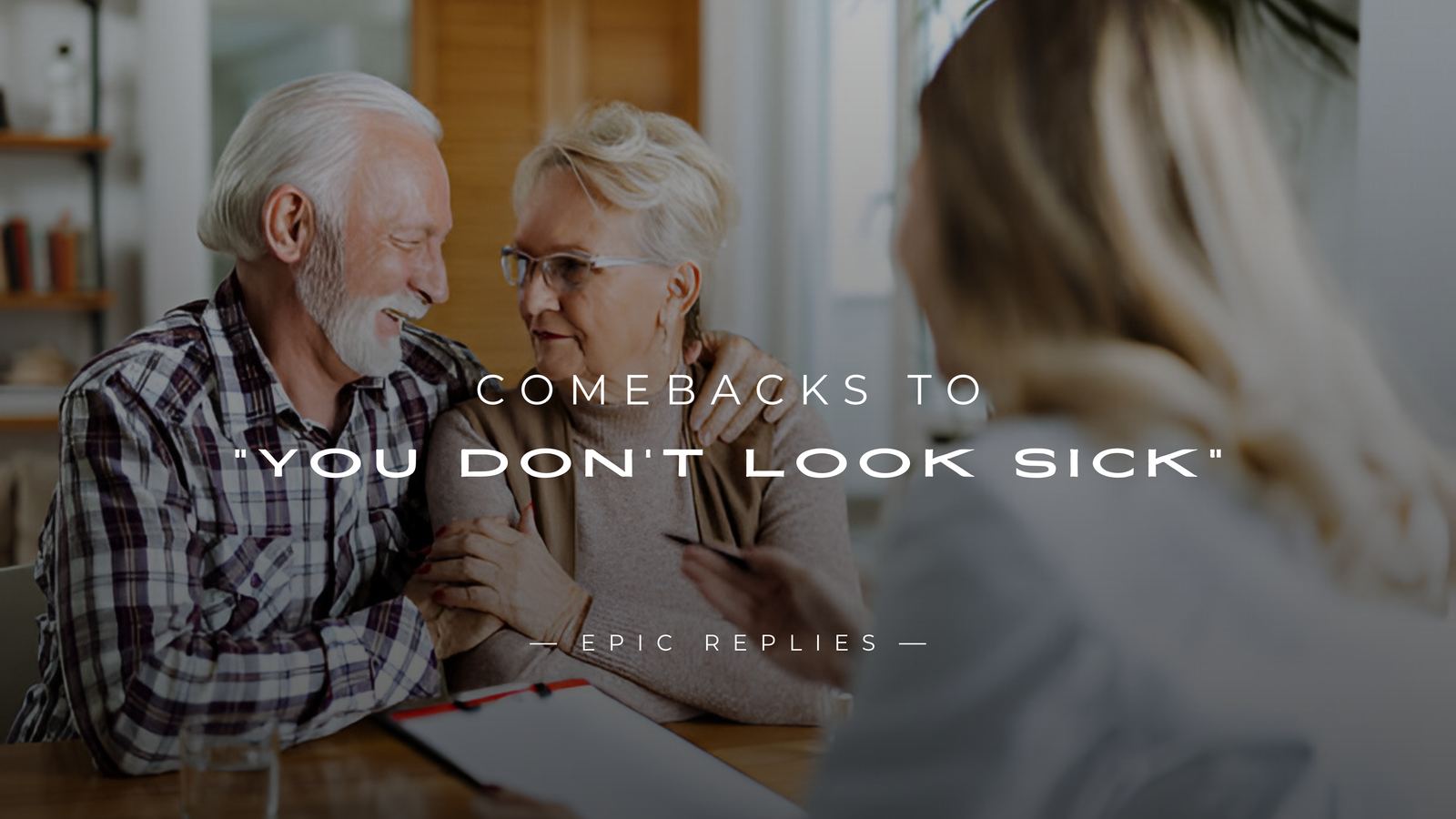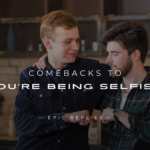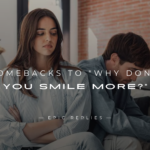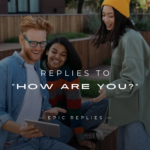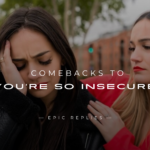If you live with a chronic illness, chances are you’ve heard the phrase “You don’t look sick” at some point. It’s one of those comments that, while probably meant as a compliment, can sometimes feel dismissive or frustrating. The truth is, people with chronic illnesses often face an invisible battle, and their conditions aren’t always apparent on the outside. So how should you respond when someone tells you, “You don’t look sick”? In this article, we’ll explore some effective and thoughtful comebacks to help you handle this common phrase with grace, humor, and maybe even a little education.
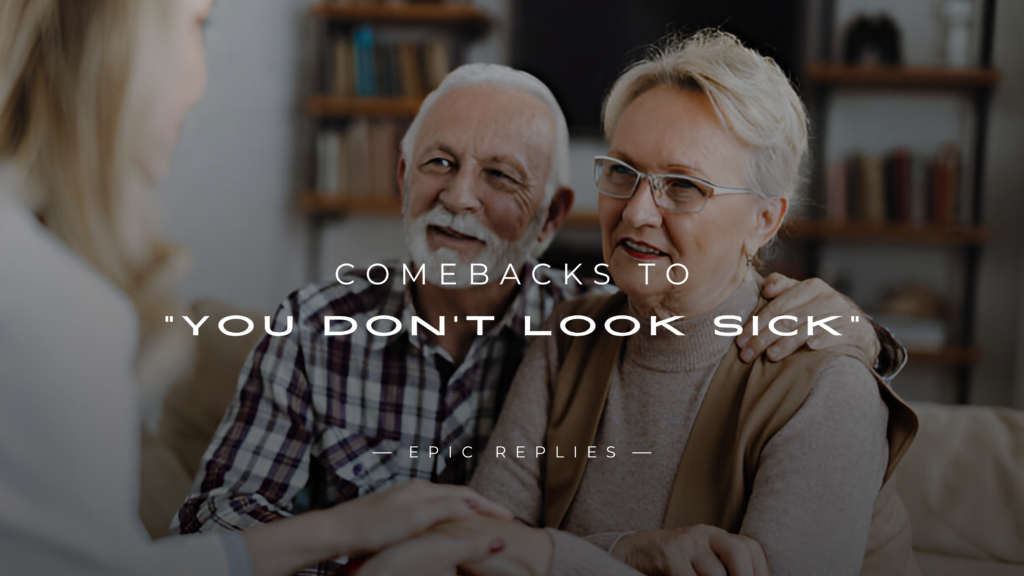
220+ Comebacks to “You Don’t Look Sick”
Humorous / Light-hearted
- I know, right? My illness really should try harder to match my aesthetic.
- I guess I missed the memo that said I had to look like a zombie to be sick!
- Trust me, if you had X-ray vision, you’d see the hot mess inside.
- My illness is shy—it doesn’t like to show off.
- Yeah, I’m going for the ‘chronic illness but make it fashion’ look.
- I should add ‘looking deceptively healthy’ to my list of special skills.
- I don’t look like a billionaire either, but here we are.
- It’s a good thing, right? Imagine if I looked as bad as I felt!
- Invisible illness—now you see it, now you don’t! Magic.
- It’s all part of my master disguise. Next, I’ll work on invisibility.
Sarcastic / Sassy
- Oh no! I forgot to bring my ‘officially sick’ certificate today.
- Darn it, I must have left my ‘visibly unwell’ outfit at home.
- You don’t look rude, but here we are.
- Oh, let me just adjust my face to match my insides—better?
- I know, right? I should really try harder to look miserable.
- I didn’t realize I needed permission to be sick while looking decent.
- Hold on, let me roll around in some dirt so I look the part.
- Ah, the classic ‘you don’t look sick’ diagnosis. Medical degree, I assume?
- I’ll be sure to notify my illness to make me look worse for next time.
- Guess I’m failing at looking as terrible as I feel—so embarrassing.
Assertive / Empowered
- You don’t have to see it for it to be real.
- Sickness isn’t always something you can spot from the outside.
- I don’t owe anyone a certain look to validate my experience.
- Looking fine doesn’t mean I’m not fighting hard every day.
- I may not look sick, but I feel it in ways you can’t imagine.
- Illness doesn’t have a ‘look’—that’s just a stereotype.
- Just because I can fake a smile doesn’t mean I’m not struggling.
- I work hard to live my life despite my condition. That doesn’t mean it’s easy.
- Strength isn’t about looking sick—it’s about pushing through anyway.
- I refuse to let my illness define my appearance or my worth.
Explaining / Educational
- Not all illnesses are visible—many people live with hidden conditions.
- Chronic illness means ongoing struggles, even if they don’t always show.
- There’s a reason it’s called an ‘invisible illness’—you can’t see it.
- A lot of conditions don’t change the way someone looks, just how they feel.
- Disabilities and illnesses aren’t one-size-fits-all. Some are invisible but just as real.
- It’s important to remember that health isn’t always something you can judge by appearance.
- You wouldn’t say ‘you don’t look diabetic’ or ‘you don’t look asthmatic,’ right?
- Many of us get really good at hiding how bad we actually feel.
- It’s hard to understand if you haven’t lived it, but trust me, it’s real.
- I know it’s confusing, but that’s the reality for so many people with invisible conditions.
Defensive / Protective
- You have no idea what I go through every day, so please don’t judge.
- Just because you can’t see it doesn’t mean it’s not real.
- I wish it were as simple as looking sick when I felt sick.
- You’d be surprised how many people are fighting battles you don’t see.
- I don’t need to look sick to prove I’m struggling.
- It’s not your place to decide how my illness should present itself.
- I’d trade ‘looking fine’ for actually feeling fine any day.
- If only you knew what was happening inside my body.
- It’s exhausting explaining myself over and over—please just believe me.
- I shouldn’t have to justify my health to anyone.
Self-Reflective / Thoughtful
- Yeah, that’s the weird part about my condition—it doesn’t always show.
- I’ve learned to put on a strong face, even when I feel awful.
- It’s strange how something can affect every part of my life without being visible.
- I get it—it’s hard to understand something you can’t see.
- Some days, I even trick myself into thinking I’m fine.
- It’s a blessing and a curse—to look okay but not feel okay.
- It’s taken me a long time to accept that my illness is real, even if others don’t see it.
- I wish people could see the struggle, but at the same time, I don’t want pity.
- It’s one of those things you don’t really think about until you experience it.
- I don’t blame people for not understanding, but I do wish they’d listen.
Angry / Frustrated
- What exactly do you think ‘sick’ is supposed to look like?
- So I have to look miserable for you to believe me?
- It’s exhausting having to prove my illness to people every day.
- Oh, I’m sorry, I didn’t realize I needed to look worse for you to take me seriously.
- Maybe if people stopped questioning me, I’d feel a little better.
- Do you expect me to walk around with a sign that says ‘I’m sick’?
- This is why people with invisible illnesses struggle—because no one believes them.
- You don’t look ignorant, but here we are.
- If you felt what I feel every day, you’d never question someone’s illness again.
- I shouldn’t have to ‘prove’ my pain to anyone.
Relatable / Understanding
- Yeah, it’s weird, right? I didn’t realize being sick had a dress code.
- I know—it’s one of the toughest parts of having an invisible illness.
- I totally get why you’d think that. It’s hard to understand what you can’t see.
- Honestly, I wish I didn’t have to keep explaining this, but I get why people ask.
- It’s frustrating, but I try to remind myself that people usually mean well.
- You’d be surprised how many of us are struggling with invisible conditions.
- It’s one of those things that doesn’t make sense until it happens to you.
- Yeah, I wish feeling good and looking good actually went hand in hand.
- It’s funny, I look in the mirror and think the same thing—then my body reminds me.
- I get where you’re coming from, but trust me, looking fine doesn’t mean feeling fine.
Playful / Clever
- Well, I didn’t get the ‘sick person’ starter pack, so here we are.
- Yeah, my illness must have skipped the memo about making me look the part.
- I guess I’m like a malfunctioning warning label—dangerous but deceiving!
- Plot twist: I’m actually sick, but with an excellent disguise.
- It’s a secret superpower—looking fine while falling apart.
- I’m like a glitch in the system—sick but suspiciously stylish.
- You should see me when I wake up. That’s when I really look sick.
- Oh, trust me, my insides didn’t get the memo that I ‘look fine.’
- I’m living proof that you can be sick and still have a great skincare routine.
- Yeah, it’s a great party trick—10/10 would not recommend.
Inspirational / Motivational
- Sickness doesn’t define me—I choose to keep pushing forward.
- I may not look sick, but every day I fight a battle you can’t see.
- Strength isn’t about how you look; it’s about how you show up despite the struggle.
- I refuse to let my illness be the most interesting thing about me.
- Looking fine is just part of my resilience—I won’t let my illness take everything from me.
- Every day, I choose to keep going, even when my body protests.
- I’m still here, still fighting, still smiling—that’s what matters.
- I might not wear my pain on my face, but that doesn’t mean I don’t carry it.
- My illness is invisible, but my strength isn’t.
- Looking fine on the outside doesn’t mean I don’t have mountains to climb inside.
Self-deprecating / Humble
- Yeah, my illness really missed the ‘dramatic flair’ memo.
- If I had a dollar for every time I heard that, I could probably afford better healthcare.
- I guess I should be flattered? I’ll take ‘not looking like death’ as a win.
- Honestly, if looking sick was a requirement, I’d be failing miserably.
- Well, I do my best to accessorize my pain with a decent outfit.
- Maybe my body is just really bad at sending distress signals.
- My illness is invisible, just like my motivation some days.
- I guess my suffering is just really good at playing hide-and-seek.
- At least one part of me is putting in effort—too bad it’s not my immune system.
- I guess I should be grateful my misery isn’t more obvious?
Compliment Reversal
- Oh, so you’re saying I look good? I’ll take that as a win!
- I appreciate that! Now if only my body would get on board.
- Well, at least something about me is holding up!
- That’s probably the nicest way someone has dismissed my illness.
- Glad to hear I’ve still got my ‘not totally falling apart’ glow!
- Oh good, my disguise is working!
- I know, right? I should get an award for ‘Best Performance by a Chronically Ill Person.’
- Well, if looking okay is the goal, I guess I’m winning… just not at health.
- Thank you! Now, if only my energy levels matched my appearance.
- I guess my body’s good at faking it—wish I could say the same about my energy!
Over-the-Top / Dramatic
- Oh no! I forgot to bring my sick-person costume today!
- Darn it, I knew I should have added dark circles and a limp for extra effect!
- Oh, my bad—let me just collapse on the floor real quick for authenticity.
- I knew I should’ve practiced my ‘tragic sick person’ face in the mirror.
- Guess I’ll have to return my Oscar for ‘Best Performance by a Healthy-Looking Sick Person.’
- You caught me! I’m actually a robot, and my warranty just expired.
- I swear, if I had a nickel for every time I heard that, I could fund my own research lab.
- Ah yes, because illness is always so polite and visible, like a broken arm or a missing limb.
- Hang on, let me summon the dramatic lighting and music for my ‘sick person reveal.’
- I’ll try to look more tragic next time—maybe add some special effects?
Philosophical / Reflective
- It’s funny how we assume suffering has to be visible to be real.
- I guess it just goes to show how much we rely on appearances to judge others.
- Illness is a weird thing—it shapes my world even if you can’t see it.
- It’s interesting how people only believe pain when they can see it.
- We don’t question if someone is in love just because we can’t see their heart beating faster.
- It makes you think—how many others are silently struggling too?
- Some battles are fought in silence, but that doesn’t make them any less real.
- I’ve learned that health isn’t just about what you see on the outside.
- Just because something is invisible doesn’t mean it isn’t shaping my reality.
- It’s a reminder that everyone carries things we might not see at first glance.
Spiritual / Calm
- Healing and suffering are both journeys, not something you can always see.
- Looks can be deceiving, but my soul is learning and growing through it all.
- Pain is just another teacher in this life—I’m learning to listen.
- My body may struggle, but my spirit is strong.
- Illness reminds me to appreciate every good moment, no matter how small.
- I trust that there’s a purpose in every challenge, even when it’s hard to see.
- Energy moves in unseen ways—just because you can’t see my struggle doesn’t mean it’s not real.
- The outside is just a shell; what matters is what’s happening within.
- I’m learning to find peace in the chaos of my health journey.
- Every struggle brings a deeper understanding of myself and the world around me.
Witty / Clever
- Well, I didn’t realize I was auditioning for ‘Sick Person of the Year.’
- Oh no, am I failing at being sick? Should I try harder?
- Ah yes, the classic ‘you don’t look sick’ diagnosis. A truly expert opinion.
- You’re right! I should be out here looking like a Victorian ghost.
- It’s called ‘chronic illness,’ not ‘costume illness.’
- Good thing I’m not an actor—I’d never get cast as ‘Sick Person #1.’
- What can I say? I’m out here redefining the sick aesthetic.
- Yep, my illness is super considerate—it stays invisible to avoid bothering people.
- I must have unlocked the ‘Stealth Mode’ feature on my condition.
- Trust me, my symptoms are like a terrible WiFi signal—just because you don’t see them doesn’t mean they aren’t there.
Caring / Compassionate
- I know it’s hard to understand—it’s a lot to wrap your head around.
- I appreciate your curiosity. It’s a reminder of how little we talk about invisible illnesses.
- I get why you’d think that. It’s confusing when we expect illness to look a certain way.
- It’s okay—I know you’re just trying to understand.
- I actually used to think the same thing before I went through it myself.
- I appreciate you noticing something seems different, even if it’s hard to see.
- I know you mean well! It just gets exhausting having to explain it all the time.
- Your perspective makes sense, but for people like me, it’s a daily challenge.
- If you ever want to learn more about invisible illnesses, I’d be happy to share.
- I don’t blame anyone for not understanding, but I do appreciate when people try to listen.
Confident / Bold
- Looking fine doesn’t mean I’m not strong as hell for dealing with this every day.
- I don’t need to ‘look sick’ to prove my struggle is real.
- Just because you can’t see my battle doesn’t mean I’m not fighting.
- I carry this illness with grace, but don’t mistake that for ease.
- I refuse to let my illness define how I present myself to the world.
- Strength isn’t about looking weak—it’s about showing up anyway.
- I may not look sick, but I am powerful beyond my pain.
- I own my experience, and I don’t need anyone’s validation to know it’s real.
- Trust me, I’m tougher than I look.
- I won’t let my illness take my confidence along with my energy.
Gritty / Determined
- Yeah, I don’t look sick because I fight like hell every day to keep going.
- That’s because I refuse to let it break me.
- If I looked as bad as I felt, I’d scare small children.
- I don’t have the luxury of giving up—I just keep pushing forward.
- You don’t see the struggle because I work hard to keep moving through it.
- My illness may be invisible, but my determination isn’t.
- You have no idea how much effort it takes to ‘look fine’ while feeling awful.
- I’d rather focus on living than looking the part of someone who’s struggling.
- Every day is a fight, but I don’t back down easily.
- I’ve learned to keep going, even when my body begs me to stop.
Empathetic / Understanding of Others
- Yeah, it’s a weird thing, right? A lot of struggles in life are invisible.
- I get it—it’s hard to believe in something you can’t see.
- I used to think illness always had a ‘look’ too, until I ended up here.
- It’s crazy how many people are silently dealing with things you’d never guess.
- The world is full of people who look okay but are fighting battles you can’t see.
- Not all pain is visible, but that doesn’t make it any less real.
- It makes me wonder how many people I’ve misjudged in the past, too.
- We never really know what someone else is going through, do we?
- I think we’re all carrying something that’s invisible to the rest of the world.
- Your question reminds me how important it is to be kind to everyone—we never know their story.
Playful / Teasing
- What can I say? I’m a medical mystery!
- Yeah, my illness is sneaky like that—hiding in plain sight!
- What, did you want me to show up in a hospital gown?
- Oh, don’t worry, my insides got the ‘sick’ memo loud and clear!
- Yep, my illness is the ultimate master of disguise.
- Maybe I should start carrying a ‘sick person’ badge for credibility.
- Want me to start limping for dramatic effect?
- Oh no! Am I supposed to be auditioning for a sick role?
- I guess I missed the ‘Sick Look 101’ class.
- I’d offer you a tour of my symptoms, but I don’t think you’d enjoy the trip.
Grateful / Positive
- Honestly, I’m thankful that I don’t look as bad as I feel.
- That just means I’m doing my best to push through!
- I take it as a compliment—I work hard to live as normally as I can.
- I’m glad my illness isn’t written all over my face—it gives me a little normalcy.
- That means my efforts to keep going are paying off.
- It’s a blessing in a way—at least I can blend in when I need to.
- Every day I can smile is a day I’m grateful for.
- I focus on the good moments, even when the bad ones are lurking in the background.
- I choose to show up and live my life, no matter how I feel.
- I may be sick, but I’m still finding reasons to be happy.
Understanding the Phrase
- What Does “You Don’t Look Sick” Really Mean?
On the surface, the phrase “You don’t look sick” might sound like a harmless comment. After all, who wants to look unwell? But for those living with chronic illnesses or invisible conditions, the statement can feel invalidating. It’s as though people are implying that if you look okay, you must be okay. The reality, however, is that many chronic conditions—like fibromyalgia, multiple sclerosis, or chronic fatigue syndrome—don’t have visible symptoms.
- Why People Say It: Lack of Awareness or Sympathy?
Most of the time, when someone says, “You don’t look sick,” they’re not trying to be hurtful. It’s just that they may not understand what it’s like to live with an invisible illness. People who have never experienced a chronic condition might not realize that sickness isn’t always something you can see. This lack of awareness often leads to well-meaning yet frustrating comments.
Why “You Don’t Look Sick” Can Be Harmful
- The Invisible Struggles of Chronic Illness
Living with an invisible illness means that the struggles you face on a daily basis are hidden from view. You might wake up feeling exhausted, have pain that’s hard to explain, or struggle with mental fog, but no one sees that. When someone tells you, “You don’t look sick,” it can feel like they’re dismissing what you go through. The assumption that you should appear sick in order to be truly ill can be emotionally exhausting.
- Emotional and Psychological Impact on the Sick Person
Such comments can make people with chronic illnesses feel isolated or misunderstood. It may also lead to feelings of guilt or shame, as if you’re somehow not living up to others’ expectations of how you should appear when you’re ill. It’s important to acknowledge these feelings and give yourself permission to feel frustrated or upset about it.
How to Respond to “You Don’t Look Sick”
- The Importance of Educating Others
Instead of just letting the comment slide, consider using it as an opportunity to educate others about invisible illnesses. By calmly explaining your condition, you can help others understand the complexity of chronic illness. The goal isn’t to make them feel bad, but to foster empathy and awareness.
- Be Calm and Assertive in Your Responses
When responding, it’s important to stay calm and assertive. This isn’t about confrontation—it’s about helping others see things from your perspective. You have the right to express how the comment makes you feel without resorting to anger or frustration.
Different Approaches to Responding
Using Humor to Defuse the Situation
Humor is a great tool to lighten the mood and disarm people who may not be aware of how their words affect you. A funny comeback can change the tone of the conversation and get the message across without creating tension. Here are a few humorous examples:
- “Well, I don’t feel sick either, but my body has other plans.”
- “I’m like a superhero—my powers are invisible.”
Responding Honestly and Factually
Sometimes, a simple and honest response can go a long way. Educate the person about your illness and let them know that not all illnesses are visible. You could say something like:
- “It’s an invisible illness, but that doesn’t make it any less real.”
- “I might look fine on the outside, but I’m living with chronic pain every day.”
Setting Boundaries and Raising Awareness
If you’re not in the mood to educate someone, it’s okay to set boundaries. You can simply say something like, “I’d prefer not to discuss my health right now,” or “I’d rather not get into it.” It’s your health, and you have every right to protect your emotional well-being.
Offering an Empathetic Response
Sometimes, all it takes is a little empathy to change the conversation. A simple, “I understand that it’s hard to grasp what an invisible illness is like,” can open up a more compassionate dialogue.
Example Comebacks You Can Use
Here are some example responses you can use when faced with the comment “You don’t look sick”:
- “Sickness doesn’t always show on the outside.”
- “That’s because I’m really good at hiding it.”
- “You don’t always see the battle I’m fighting inside.”
- “It’s an invisible illness, but that doesn’t make it any less real.”
- “I may look okay, but trust me, it’s a struggle.”
Why Humor Can Help
- Using Humor to Lighten the Mood
Humor can be an excellent way to disarm potentially awkward situations. Making a joke out of it can not only lighten the mood but also show that you’re not taking things too seriously. Humor can also create more understanding by helping the other person see the situation from a different angle.
- How Humor Can Create More Understanding
By responding with humor, you may help others realize that invisible illnesses are not something that’s easily understood. It’s a lighthearted way to open the door to a deeper conversation.
- Examples of Funny Yet Impactful Comebacks
Here are some examples of humorous responses that still convey the seriousness of your situation:
“I’m like a ninja—quiet, stealthy, and often invisible.”
“I save my energy for more important things, like making it through the day.”
When to Get Serious
- Choosing the Right Time to Educate Others
While humor is great, there are times when a more serious approach is needed. If the person’s comment comes from a place of ignorance, this might be a good chance to educate them about your condition. It’s important to gauge the situation and decide when it’s appropriate to share more information.
- Providing Resources for Better Understanding
If someone seems genuinely interested in learning more, offer them resources or articles about your condition. This can help broaden their understanding and potentially prevent similar comments in the future.
Setting Boundaries
- Knowing When to End the Conversation
Not every conversation needs to turn into an educational moment. If you’ve made it clear how the comment made you feel and the person doesn’t seem to get it, don’t be afraid to end the conversation. Protect your peace.
- Protecting Your Emotional Health
It’s okay to put yourself first. If a conversation is draining you or making you feel worse, it’s okay to walk away. Your emotional health is just as important as your physical health.
Conclusion
In conclusion, navigating the challenges of living with an invisible illness can be difficult, especially when faced with dismissive comments like “You don’t look sick.” With over 220 powerful comebacks at your disposal, you now have the tools to assertively respond and educate others while standing up for yourself. Remember, it’s important to feel empowered and comfortable in expressing your truth. If you’re ever in need of more responses to handle challenging situations, check out our 220+ Snappy Comebacks to “You’re Being Paranoid”, where you’ll find even more ways to deal with insensitive remarks. Stay strong, and never be afraid to speak your mind!
FAQs
Q. What if someone still doesn’t understand my illness even after explaining?
Sometimes, despite your best efforts, people may not understand. It’s important to protect your own peace and decide when to disengage from the conversation.
Q. How can I explain invisible illnesses to children or younger people?
Use simple language and relatable examples. You might say, “Just because you can’t see my illness doesn’t mean it’s not real, like how you can’t always see a cold but you know it’s there.”
Q. Is it okay to ignore comments like “You don’t look sick”?
Yes, it’s okay to ignore comments if you’re not in the mood to explain or educate. Your emotional health should come first.
Q. Can I respond with sarcasm or should I always be polite?
Sarcasm can be funny, but it’s important to gauge the situation. Some people might not understand it, so use it wisely.
Q. What should I do if the person who says “You don’t look sick” is a close friend or family member?
If a close friend or family member says this, it might be a good time to have a heart-to-heart conversation about your illness and its challenges.
